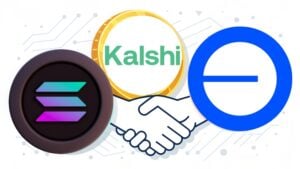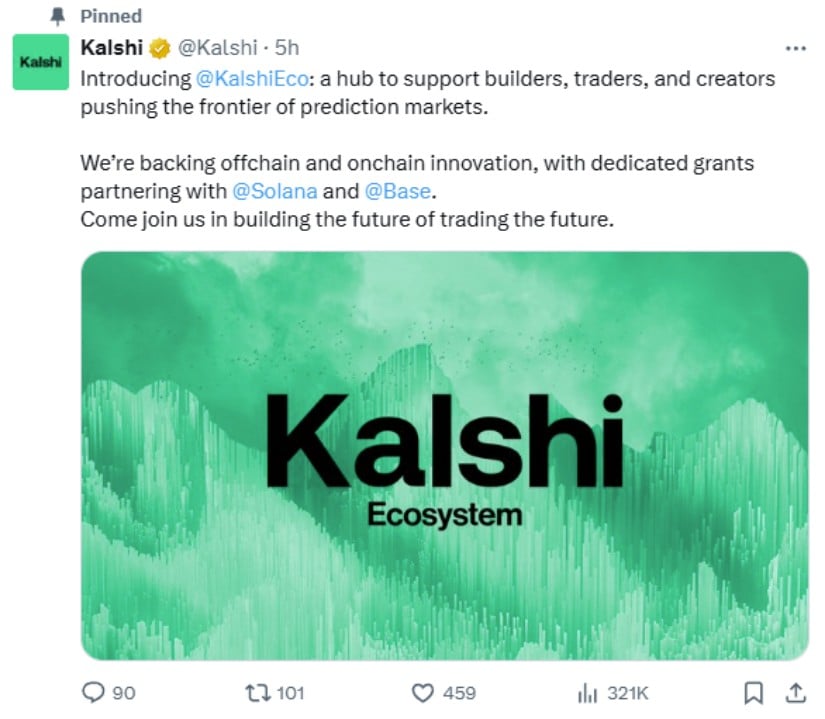Kalshi Launches Blockchain Ecosystem Hub with Solana and Base Partnership

The hub aims to attract builders, traders, and content creators through grants, technical support, and marketing assistance.
This move represents Kalshi’s expansion into blockchain development after establishing itself as the first CFTC-regulated prediction market platform in the United States. The company allows users to trade on real-world event outcomes, from political elections to economic indicators.
Building Bridges Between Traditional Finance and Crypto
KalshiEco Hub combines Kalshi’s regulatory expertise with crypto-native infrastructure from two major blockchain networks. The partnership brings together Solana’s high-speed transaction capabilities—processing up to 65,000 transactions per second—with Base’s layer-2 scaling technology designed to reduce costs and increase processing speed.
The hub offers multiple support services to ecosystem participants. These include financial grants for developers, technical assistance for project building, and marketing support for selected initiatives. Early collaborators include Kalshinomics, a market analytics dashboard, and Verso, which develops professional trading tools for market discovery.

Source: @Kalshi
Kalshi also announced native support for Solana (SOL) deposits, allowing users to fund accounts directly from their wallets with limits up to $500,000. This builds on the platform’s existing crypto support for Bitcoin, USDC, and Worldcoin through partnerships with Zero Hash for regulatory compliance.
Closing the Gap with Market Leaders
The ecosystem launch comes as Kalshi narrows the trading volume gap with competitor Polymarket. Last month, Kalshi registered $875 million in volume compared to Polymarket’s $1 billion, according to industry data.
Kalshi’s growth trajectory shows significant momentum. The platform reported monthly trading volumes of $13 million in early 2025, with peak volumes reaching $26 million in October 2024. Revenue growth hit 1,220% in 2024, while the company recently completed a $185 million Series C funding round led by Paradigm and Sequoia at a $2 billion valuation.
The prediction market sector has attracted major institutional interest. Reports suggest Kalshi is close to raising additional funds at a $5 billion valuation, while Polymarket recently secured $200 million at a $1 billion valuation.
Expanding Solana’s Utility Beyond Memes and DEX Trading
For Solana, the Kalshi partnership creates new use cases beyond decentralized exchange trading and meme coins, which accounted for 65% of the network’s trading volume in May 2025. The integration allows SOL holders to participate in prediction markets without converting to stablecoins first, potentially boosting on-chain demand and market depth.
The timing aligns with significant institutional adoption of Solana. In Q2 2025, $1.4 billion in institutional capital flowed into Solana, with public companies staking 1.9 million SOL valued at $320.4 million. Solana’s DeFi total value locked reached $8.6 billion, supported by the launch of the first U.S. Solana staking ETF and growing corporate treasury holdings totaling 3.44 million SOL worth $970 million.
Strategic Positioning Against Regulatory Headwinds
Kalshi’s regulatory status provides a competitive advantage as prediction markets face scrutiny at state levels. The platform holds CFTC approval across all 50 U.S. states, granting legitimacy with traditional investors and institutions that unregulated platforms lack.
The company recently hired crypto influencer John Wang as head of crypto to expand its digital asset presence. Strategic partnerships include collaboration with Robinhood for football prediction markets and integration with World App for Worldcoin users.
Coinbase Ventures head Hoolie Tejwani identified prediction markets as a “killer onchain use case” due to blockchain’s growth, smart contract security, and stablecoin adoption.
The regulatory environment remains complex. While prediction markets gained mainstream attention during the 2024 presidential election cycle, some states have issued cease-and-desist orders questioning whether event contracts constitute gambling rather than legitimate financial products.
The Road Ahead: Innovation Meets Regulation
The KalshiEco Hub launch positions the platform at the intersection of regulated finance and blockchain innovation. Early partnerships focus on analytics tools, professional trading infrastructure, and retail user experiences. The initiative may establish new standards for regulatory-compliant DeFi integration as traditional finance increasingly explores blockchain applications.
Prediction markets demonstrated their accuracy during major events, often outperforming traditional polling methods. According to Kalshi data from late 2024, there was a 91% chance Bitcoin would hit $100,000 before the end of that year, showing the platform’s role in aggregating market sentiment on financial outcomes.
The success of this blockchain ecosystem initiative could accelerate broader institutional adoption of prediction markets while creating new utility for established networks like Solana and emerging platforms like Base.
Betting on Blockchain’s Future
Kalshi’s ecosystem hub represents a calculated bet that prediction markets will become a major blockchain use case. By combining regulatory compliance with crypto-native infrastructure, the platform aims to bridge traditional finance and decentralized innovation. The partnership’s success may determine whether regulated prediction markets can compete with their unregulated counterparts while maintaining institutional legitimacy.
Vous aimerez peut-être aussi

Zero Knowledge Proof Crypto Opens Whitelist Before Global Launch

Brazilië overweegt crypto belasting op betalingen – transacties dreigen te verstikken
